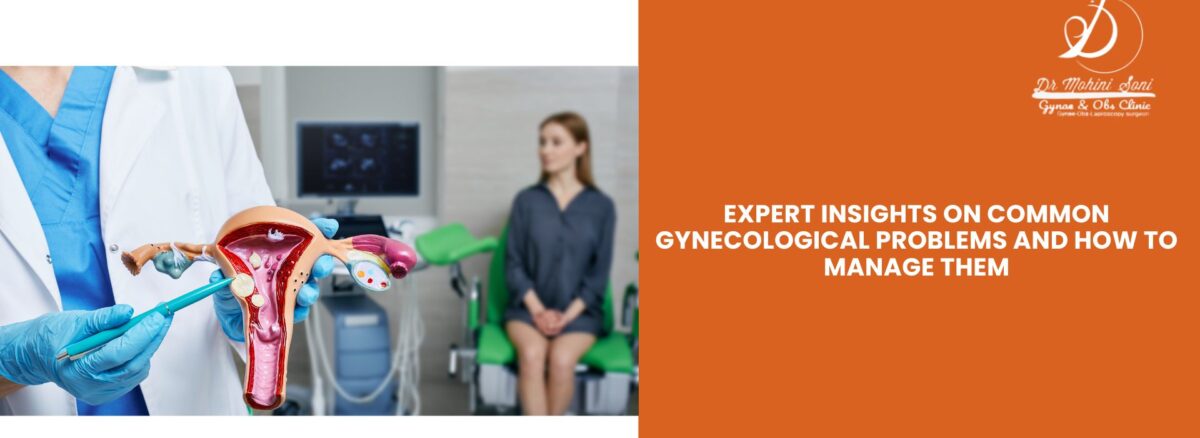Women’s health is a topic that deserves more attention and open conversations. Yet, many women silently deal with common gynecological problems, either because they feel embarrassed or because they don’t know where to start. The truth is — you’re not alone, and there are simple, effective ways to manage most issues with the right care and guidance.
In this blog, we’ll talk about some of the most common gynecological problems women face and share expert tips on how to deal with them. Whether you’re in your 20s or your 50s, this guide can help you better understand your body and take charge of your health.
Irregular Periods
Irregular periods are one of the most common issues women face. This means your periods don’t follow a regular cycle — they may come early, late, or sometimes not at all.
Possible causes:
- Stress
- Polycystic Ovary Syndrome (PCOS)
- Thyroid issues
- Weight changes
- Hormonal imbalance
How to manage:
- Maintain a healthy diet and exercise routine
- Reduce stress with yoga or meditation
- Visit a gynecologist to check for underlying conditions like PCOS or thyroid problems
- Birth control pills or hormone therapy may help regulate your cycle, but only under medical advice
PCOS (Polycystic Ovary Syndrome
PCOS is a hormonal disorder that affects many women, especially those of childbearing age. Symptoms include irregular periods, weight gain, acne, and unwanted hair growth.
How to manage:
- Focus on a balanced diet — low in sugar and refined carbs
- Regular physical activity helps control weight and hormone levels
- Consult a gynecologist for medication to manage periods and insulin resistance
- Regular monitoring is important to prevent future complications like diabetes or infertility
Yeast infections, bacterial vaginosis, and urinary tract infections (UTIs) are all common and usually treatable.
Vaginal Infections
Common signs:
- Itching, burning, or unusual discharge
- Pain during urination
- Foul odor
How to manage:
- Keep the vaginal area clean and dry
- Avoid scented soaps and harsh products
- Wear breathable cotton underwear
- Drink plenty of water and maintain hygiene during periods
- See a doctor for accurate diagnosis and treatment — don’t self-medicate
- Menstrual Cramps
Painful periods, also known as dysmenorrhea, can make everyday tasks difficult for many women.
How to manage:
- Use a heating pad on your lower abdomen
- Over-the-counter painkillers like ibuprofen (under medical advice)
- Gentle exercise, stretching, or yoga can reduce cramps
- If pain is severe and affects your daily life, see a gynecologist — it could be a sign of conditions like endometriosis
- Menopause Symptoms
- Menopause usually starts between ages 45–55 and brings several physical and emotional changes. Common symptoms include hot flashes, mood swings, vaginal dryness, and sleep problems.
How to manage:
- Stay active and eat a diet rich in calcium and vitamin D
- Talk to your doctor about hormone replacement therapy (HRT) if symptoms are severe
- Herbal supplements may help, but always use them under guidance
- Practice mindfulness or join a support group — emotional health is just as important
When to See a Gynecologist
Don’t wait for symptoms to get worse. You should visit a gynecologist if you notice:
- Irregular or painful periods
- Unusual discharge or odor
- Severe cramps
- Bleeding between periods
- Any change in your normal cycle
- Early diagnosis and treatment can prevent complications and improve your quality of life.
Conclusion
Gynecological health is a key part of your overall well-being. Whether it’s managing painful periods, dealing with PCOS, or going through menopause — the right information and expert care can make a big difference.
Always listen to your body, never ignore the signs, and don’t hesitate to seek help. A healthy woman is a confident, empowered woman — and you deserve nothing less.

